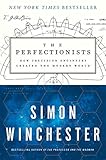The perfectionists : how precision engineers created the modern world / Simon Winchester.
Material type: TextLanguage: English Publication details: New York : Harper Perennial, 2018.Description: xii, 395 pages ; illustrations ; 24 cmISBN:
TextLanguage: English Publication details: New York : Harper Perennial, 2018.Description: xii, 395 pages ; illustrations ; 24 cmISBN: - 9780062652560
- 0062652567
- How precision engineers created the modern world
- 621.8
- TA 19 W759p 2018
| Item type | Current library | Home library | Collection | Shelving location | Call number | Copy number | Status | Date due | Barcode |
|---|---|---|---|---|---|---|---|---|---|
 Libro
Libro
|
Biblioteca Juan Bosch | Biblioteca Juan Bosch | Humanidades | Humanidades (4to. Piso) | TA 19 W759p 2018 (Browse shelf(Opens below)) | 1 | Available | 00000122544 |
Browsing Biblioteca Juan Bosch shelves, Shelving location: Humanidades (4to. Piso), Collection: Humanidades Close shelf browser (Hides shelf browser)

|

|

|

|
No cover image available |

|

|
||
| T 385 I43m 2002 Microsoft Visio 2002 / | T 385 S359g 2003 Geometric tools for computer graphics / | TA 15 B932 1992 The builders : marvels of engineering / | TA 19 W759p 2018 The perfectionists : how precision engineers created the modern world / | TA 28 S165i 1982 La ingeniería para la infraestructura del medio rural : ponencia de ingreso a la academia de ingeniería / | TA 139 E57 2015 Engineers / | TA 157 U84 2018 U.S. engineering in a global economy / |
Includes bibliographical references (pages 369-374) and index.
Stars, seconds, cylinders, and steam -- Extremely flat and incredibly close -- A gun in every home, a clock in every cabin -- On the verge of a more perfect world -- The irresistible lure of the highway -- Precision and peril, six miles high -- Through a looking glass, distinctly -- Where am I, and what is the time? -- Squeezing beyond boundaries -- On the necessity for equipoise -- The measure of all things.
The revered New York Times bestselling author traces the development of technology from the Industrial Age to the Digital Age to explore the single component crucial to advancement—precision—in a superb history that is both an homage and a warning for our future.
The rise of manufacturing could not have happened without an attention to precision. At the dawn of the Industrial Revolution in eighteenth-century England, standards of measurement were established, giving way to the development of machine tools—machines that make machines. Eventually, the application of precision tools and methods resulted in the creation and mass production of items from guns and glass to mirrors, lenses, and cameras—and eventually gave way to further breakthroughs, including gene splicing, microchips, and the Hadron Collider.
Simon Winchester takes us back to origins of the Industrial Age, to England where he introduces the scientific minds that helped usher in modern production: John Wilkinson, Henry Maudslay, Joseph Bramah, Jesse Ramsden, and Joseph Whitworth. It was Thomas Jefferson who later exported their discoveries to the fledgling United States, setting the nation on its course to become a manufacturing titan. Winchester moves forward through time, to today’s cutting-edge developments occurring around the world, from America to Western Europe to Asia.
As he introduces the minds and methods that have changed the modern world, Winchester explores fundamental questions. Why is precision important? What are the different tools we use to measure it? Who has invented and perfected it? Has the pursuit of the ultra-precise in so many facets of human life blinded us to other things of equal value, such as an appreciation for the age-old traditions of craftsmanship, art, and high culture? Are we missing something that reflects the world as it is, rather than the world as we think we would wish it to be? And can the precise and the natural co-exist in society?


There are no comments on this title.